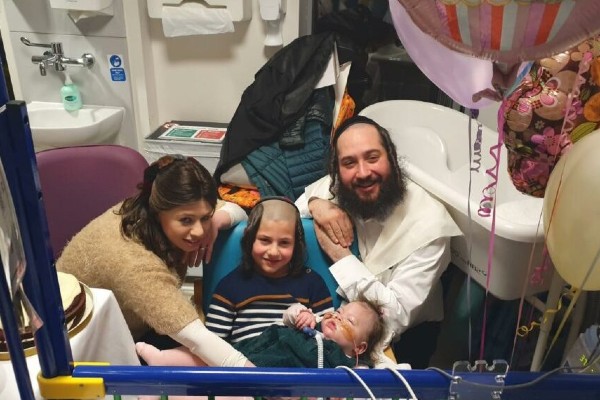“A country that supposedly doesn’t have capital punishment today enacted a death penalty couched in fancy legalese,” said Brooklyn-based Rabbi David Niederman.
By Pesach Benson, United With Israel
Alta Fixsler, an Israeli toddler who became the center of an emotional legal and ethical battle, died on Monday after medical personnel at a Manchester hospice removed her life support.
Hamodia reported that Alta was with her parents when the doctors disconnected the ventilator. The paper reported that a quorum of 10 men prayed for her, but she passed away after 90 minutes.
Hundreds of Jews attended her funeral in Manchester on Monday night. Alta’s body will be brought to Israel for burial.
Due to complications during birth, Alta had been on a ventilator all her life.
The Royal Manchester Children’s Hospital sought to remove Alta’s respirator and place her in palliative care. But the parents, Avraham and Chaya Fixsler, Hassidic Jews and Israeli nationals, wanted to bring Alta back to Israel where a hospital had agreed to accept her. Removing Alta’s ventilator, the parents said, went against their religious beliefs.
But the RMCH refused to discharge Alta, claiming that Alta could sense discomfort and had “no prospect” for recovery. Allowing Alta to be taken overseas, the hospital argued, wasn’t in the girl’s best interests.
That prompted a months-long legal battle pitting the Fixslers against Britain’s National Health Service and the Manchester University NHS Foundation Trust, which runs the hospital. Officials in Israel, including then-president Reuven Rivlin, appealed to British health authorities and other notables on behalf of the Fixslers. Because Avraham Fixsler is also a U.S. citizen, Senator Chuck Schumer (D-NY) obtained an expedited visa for Alta to come to the U.S. for care and was in the process of acquiring U.S. citizenship for her as well.
A ruling by Justice Alistair MacDonald that transferring Alta to Israel was not in her interests ultimately stood when the European Court of Human Rights declined to intervene. Justice MacDonald’s July ruling sparked particular outrage in the Jewish community for suggesting that Alta would have wanted to be taken off of life support.
“I am satisfied,” he wrote, “that, in circumstances where she has not developed any understanding of the faith into which she was born, and giving due weight to the fact that a child’s attitude may be and often is influenced by the views, beliefs and guidance of his or her parents, it is more likely than not that Alta’s point of view would be that continued life-sustaining treatment would not be acceptable to her.”
A second legal battle ensued when the Fixslers fought for Alta’s ventilator to be removed at home rather than in a hospice. That battle, too, was unsuccessful, when the Trust argued that the Fixslers’ home wasn’t safe for the special bed and medical equipment — a claim the family denied.
In a statement to Hamodia, Sen. Schumer said, “I extend my prayers and support for the Fixsler family during this very difficult time. May Alta’s memory be a blessing. I continue to believe the policy followed here was wrong on many levels and regret that our multiple, and legally and morally, well-grounded pleas were unheeded by the British authorities.”
Rabbi David Niederman, a Brooklyn-based activist lobbied on behalf of the Fixslers, slammed the British health and legal officials for letting Alta needlessly die.
“Instead of following the Hippocratic oath to ‘do no harm or injustice’ to their patients, doctors today took an action that resulted in their patient’s death,” he told HaModia.
“This utter travesty against this helpless, pure, lovely child, will never be forgotten. A country that supposedly doesn’t have capital punishment, today enacted a death penalty couched in fancy legalese.”
According to a study in Critical Care Medicine cited by the Jerusalem Post, one day of life support in cases similar to the Fixsler’s typically costs the NHS $3,000. The Post added that NHS guidelines allow British doctors to end care when there is no hope for a patient’s recovery. The Fixslers argued that transferring Alta to Israel or the U.S. would have come at no cost to the NHS or British taxpayers.
